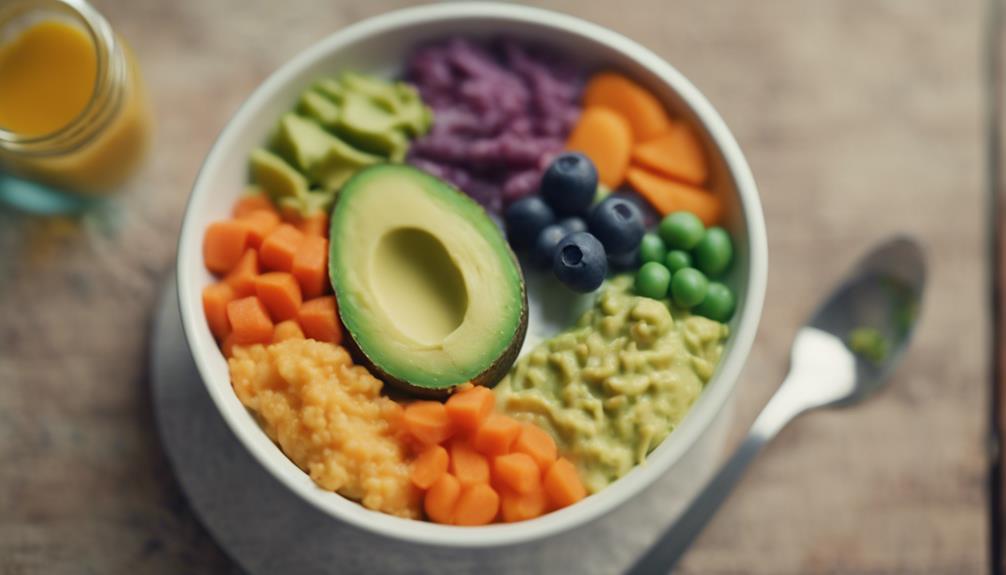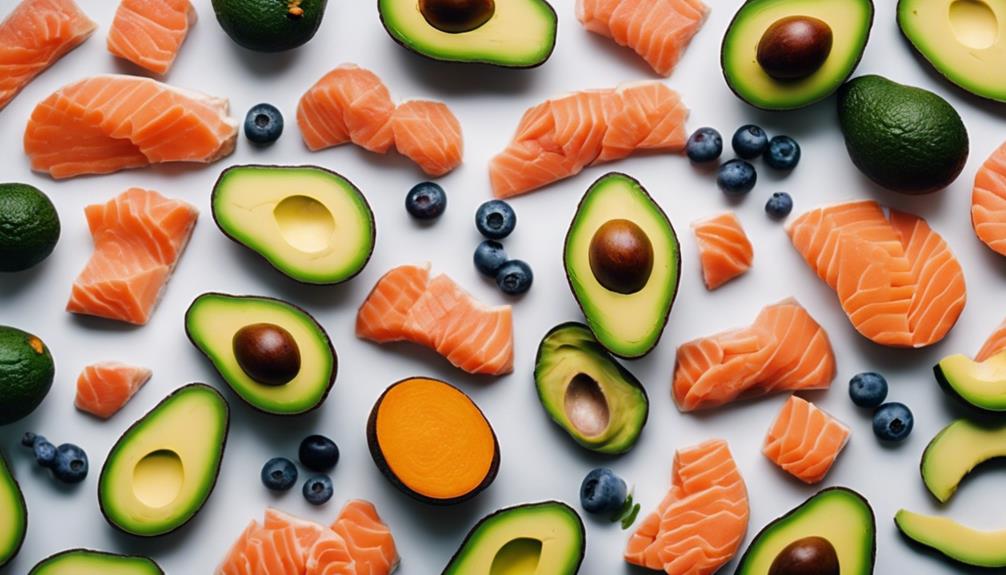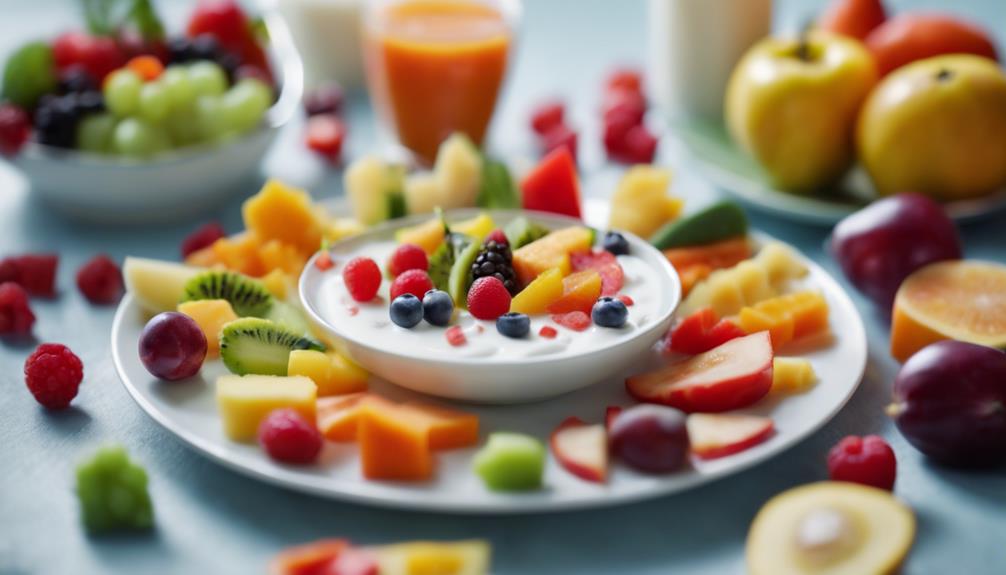For nutritious baby meals, incorporate nutrient-packed choices such as avocados, bananas, blueberries, lentils, and yogurt. Gradually introduce foods for optimal bone, teeth, and brain development. It is important to include whole milk and yogurt in the diet for protein and calcium, while avoiding honey due to the risk of botulism. Consult a pediatrician for any allergies. Include whole grains like oats, quinoa, and brown rice for digestion and energy. Provide protein sources such as eggs, poultry, and legumes for growth. Ensure hydration with water and monitor intake for proper growth. Introduce vegetables like sweet potatoes and carrots to encourage healthy eating habits early on. For additional information, consult for more details.
Key Takeaways
- Avocados, bananas, lentils, and turkey for vitamins, minerals, and iron.
- Yogurt, sweet potatoes, and blueberries for calcium, fiber, and antioxidants.
- Introduce whole grains, vegetables, and fruits for balanced nutrition.
- Include protein sources like eggs, chicken, and tofu for growth.
- Consult with a pediatrician for guidance on dairy, allergies, and portion sizes.
Nutritious First Foods
When introducing nutritious first foods to your baby, focus on providing essential nutrients for their growth and development. Start by incorporating soft options like avocados, bananas, and blueberries, which are rich in vitamins and minerals important for your baby's well-being.
Opt for nutrient-dense foods such as lentils, sweet potatoes, and yogurt to support healthy bones and teeth. These foods are packed with calcium, vitamin D, and other essential nutrients essential for bone development in infants.
Include protein foods like turkey or chicken purees in your baby's diet to make sure they receive important nutrients like zinc and iron necessary for growth. Additionally, offering a variety of fruits, vegetables, grains, and dairy products will provide a well-rounded and balanced diet for your little one's best health.
Remember to introduce fiber-rich options like prunes and vegetables to aid digestion and prevent constipation, promoting overall wellness in your baby.
Essential Dairy Products
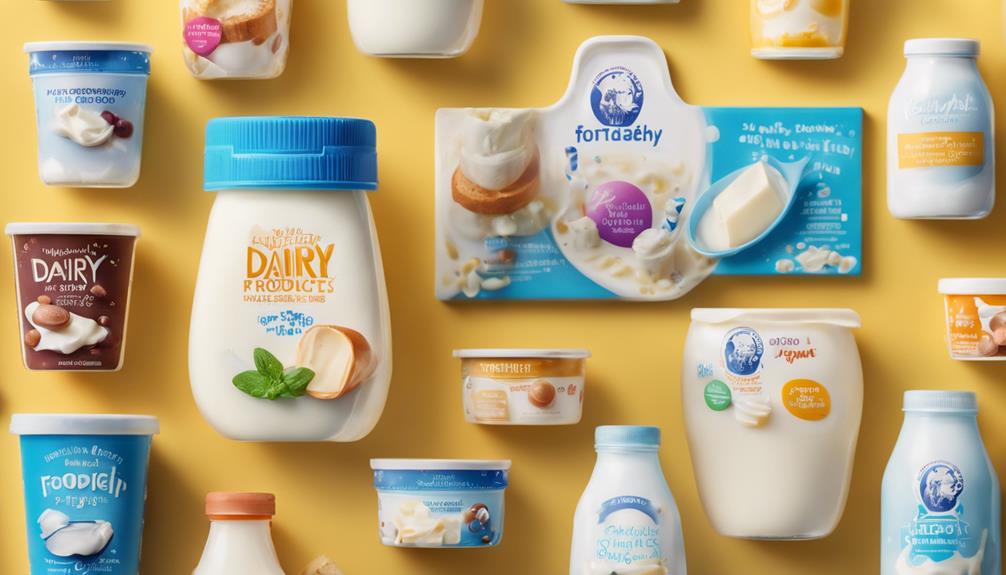
Introduce whole milk and yogurt as rich sources of protein and calcium for your baby's diet.
Be cautious with honey when offering dairy to prevent the risk of botulism.
Monitor for signs of casein allergy when introducing dairy products like milk and yogurt.
Dairy for Calcium
Ensure your baby receives essential calcium by incorporating dairy products like milk and yogurt into their diet. Milk and yogurt are important sources of calcium, crucial for bone health and development in infants.
For babies over 1 year old, whole milk is recommended as it provides both protein and calcium necessary for growth. Additionally, yogurt containing live cultures offers probiotics that support gut health and aid in digestion for your little one.
When introducing dairy products to your baby, it's important to be cautious with honey due to the risk of botulism in infants under 1 year old. Always consult with your pediatrician before making any dietary changes. If your baby has dairy allergies, plant-based alternatives like almond or soy milk can be considered under professional guidance.
Dairy Allergies Consideration
Curious how essential dairy products can be replaced for children with dairy allergies? When faced with dairy allergies, it's important to turn to plant-based alternatives to make sure your child's nutritional needs are met. Below is a table highlighting some non-dairy sources rich in essential nutrients and suitable replacements for traditional dairy products:
| Essential Dairy Product | Plant-Based Alternative | Benefits |
|---|---|---|
| Milk | Almond Milk | Fortified with calcium |
| Yogurt | Coconut Milk Yogurt | Probiotics for gut health |
| Cheese | Cashew Cheese | Protein and healthy fats |
Symptoms of dairy allergies can vary from digestive issues to skin rashes and respiratory problems. Consulting a healthcare provider is important for an accurate diagnosis and guidance on managing dairy allergies. Incorporating non-dairy sources of calcium, such as fortified plant milks and leafy greens, can support bone health in children with dairy allergies.
Whole Grains for Babies
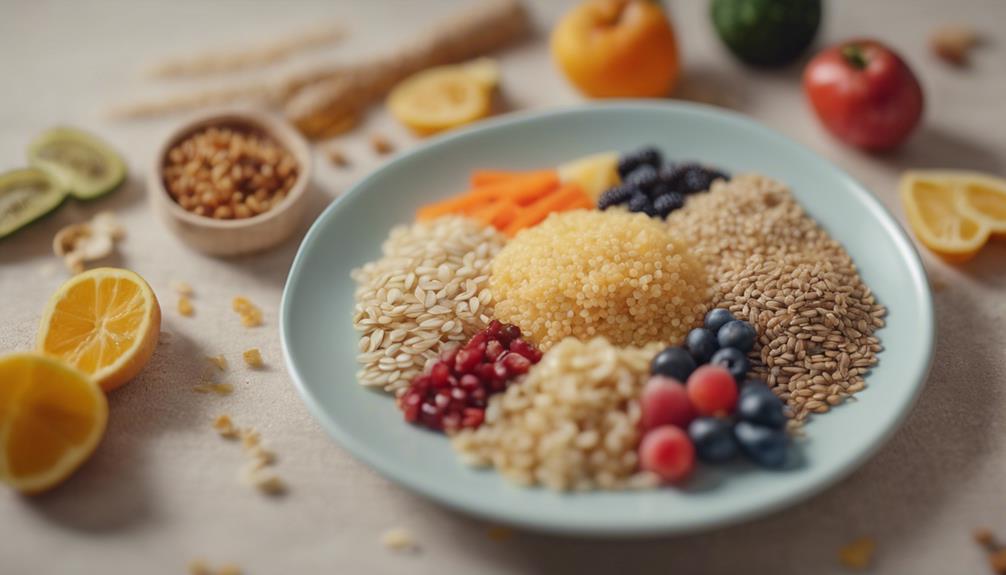
Introducing whole grains into your baby's diet is vital for their growth and development. 'Whole grains are rich in essential nutrients like fiber, B vitamins, and minerals,' states pediatric nutritionist Dr. Smith.
Opt for whole grains over refined options to support healthy digestion and sustained energy levels in your little one.
Make sure to include a variety of whole grains like oats, quinoa, and brown rice to establish healthy eating habits early on.
Nutrient-Rich Grains
How can you incorporate nutrient-rich whole grains like brown rice, quinoa, and oatmeal into your baby's diet for best growth and development?
Whole grains are packed with essential nutrients such as fiber, vitamins, and minerals important for your baby's well-being. These grains aid in nutrient absorption and provide sustained energy while promoting healthy digestion. Introduce whole grains gradually to allow your baby's digestive system to adjust and maximize the benefits. According to pediatric nutritionist Dr. Smith, 'Whole grains offer a wide range of nutrients that are essential for your baby's growth and development.'
When selecting grains for your baby, opt for whole grains over refined grains like white bread and rice. Whole grains offer more nutritional value and are a better choice for your baby's diet. Experiment with various whole grains to expose your baby to different flavors and textures, enhancing their palate and ensuring a diverse nutrient intake. As Dr. Johnson advises, 'Variety is key in a baby's diet to provide a spectrum of essential nutrients.'
Easy Digestibility Factor
For babies, incorporating nutrient-rich whole grains like oatmeal, brown rice, and quinoa can be beneficial due to their easy digestibility factor and essential nutrients.
These grains, with their soft texture and high fiber content, provide important nutrients such as iron, B vitamins, and fiber necessary for your baby's growth and development.
It's advisable to introduce whole grains gradually to prevent any potential digestive issues and help your baby adjust to new textures and flavors.
Opting for whole grain cereals or porridge can be a nutritious and easy-to-swallow option for your little one.
By including whole grains in your baby's diet, you not only support healthy digestion but also provide a valuable addition to their balanced nutrition.
Healthy Homemade Options
Enhancing your baby's diet with homemade whole grain options can greatly contribute to their overall health and well-being.
When it comes to including whole grains in your baby's foods, here are some key points to keep in mind:
- Whole grains provide essential nutrients like fiber, iron, and B vitamins important for your baby's growth and development.
- Examples of suitable whole grains for babies include oatmeal, brown rice, quinoa, and barley, offering a variety of flavors and textures.
- Introduce whole grains gradually to prevent digestive issues and monitor for any potential allergies that may arise.
- Whole grains support healthy digestion and provide sustained energy for your active baby throughout the day.
- Opting for whole grain options over refined grains ensures that your baby's diet is packed with additional nutritional benefits, promoting their overall well-being.
Protein Sources for Growth
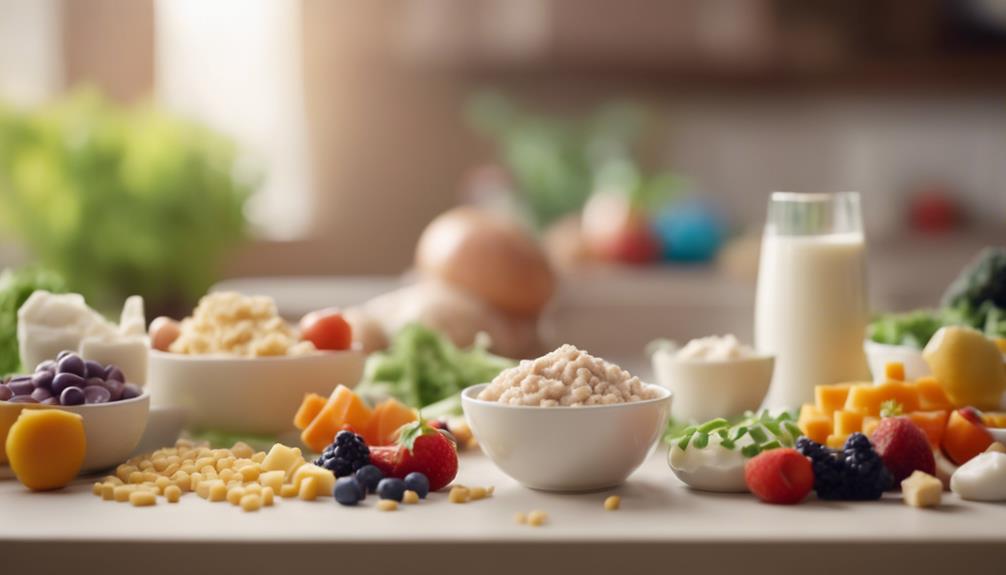
When considering protein sources for your baby's growth, focus on introducing a variety of nutrient-rich foods to support their development. Babies need protein for building muscles, tissues, and enzymes. Good sources of protein include eggs, poultry, meat, fish, tofu, and legumes like beans and lentils. These foods provide protein, aiding in brain development, immune function, and overall health in infants and toddlers. To guarantee a well-rounded diet, introduce a variety of protein sources to meet your baby's nutritional needs. Remember, consulting with a pediatrician is essential to determine the appropriate amount and type of protein based on your baby's age and developmental stage.
| Protein Sources | Benefits |
|---|---|
| Eggs | Rich in essential amino acids |
| Poultry, Meat, Fish | Good sources of heme iron for growth |
| Tofu, Legumes | Provide plant-based protein for development |
Nutrient-Dense Options
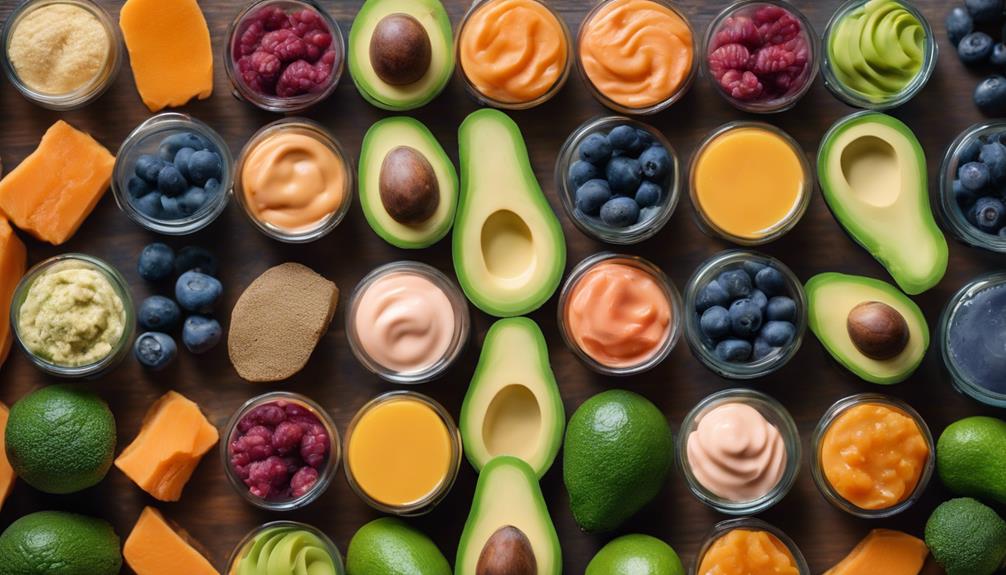
When considering nutrient-dense options for your baby, it's essential to focus on essential vitamins, protein sources, and healthy fats for peak growth and development.
Incorporating foods rich in vitamins like sweet potatoes and winter squash can provide important nutrients that support overall health.
Essential Vitamins for Babies
For nutrient-dense options, consider incorporating essential vitamins into your baby's diet through a variety of foods rich in Vitamin A, C, D, E, and K.
- Vitamin A: Introduce foods like sweet potatoes and carrots to provide beta-carotene, important for vision and immune function.
- Vitamin C: Offer fruits such as oranges and strawberries to enhance immunity and aid in iron absorption.
- Vitamin D: Guarantee adequate sunlight exposure or provide fortified foods like yogurt to support bone health and calcium absorption.
- Vitamin E: Include sources like avocados and nuts for antioxidant protection and healthy skin.
- Vitamin K: Incorporate leafy greens like spinach and kale to promote blood clotting and maintain bone health in growing babies.
These essential vitamins play significant roles in your baby's growth and development. By diversifying their diet with these nutrient-rich options, you can ensure they receive the necessary vitamins to support their overall health and well-being.
Protein Sources for Infants
To guarantee ideal growth and development in infants, explore nutrient-dense protein sources like eggs, tofu, chicken, and turkey that provide essential nutrients such as iron, calcium, and protein.
When introducing these proteins, it's important to monitor for potential allergies, especially with eggs or soy products. Soft options like chicken or turkey bites are excellent for infants adjusting to solid foods, as they're easy to chew.
These nutrient-dense protein sources play a significant role in supporting brain health, muscle growth, and overall development in infants.
Before incorporating new protein sources into your baby's diet, consult with a pediatrician to make sure they align with your baby's dietary needs and potential allergies.
Healthy Fats for Growth
Incorporate nutrient-dense options rich in healthy fats into your baby's diet to support their growth and development effectively. When thinking about healthy fats for your little one, focus on options that provide essential nutrients like omega-3 fatty acids important for brain development.
Here are some choices to ponder:
- Avocados: Rich in healthy unsaturated fats, avocados are packed with essential nutrients important for your baby's brain development.
- Olive Oil: Including olive oil in baby food recipes can offer monounsaturated fats, which are important for growth and providing energy.
- Chia Seeds: These seeds are a good source of omega-3 fatty acids, which are essential for supporting brain and eye development in infants.
- Nut Butters: Almond or peanut butter can provide healthy fats and protein, contributing to a balanced diet for your baby.
- Fatty Fish: Incorporating fish like salmon or sardines into your baby's meals can supply omega-3 fatty acids, supporting brain and nervous system development.
Hydration With Water

Make sure your 1-year-old stays hydrated by aiming for at least one 8-ounce glass of water per day. As babies move from breast milk or formula, water becomes important for maintaining hydration levels.
Monitoring your child's diapers can give you insights into their hydration status throughout the day. Water stands out as the best choice for hydration due to its natural benefits and lack of additives. Proper hydration is key for your child's overall health and well-being, supporting their body functions and growth.
It is essential to adjust your child's water intake based on their activity levels and the environmental conditions they're exposed to. Remember, hydration needs can vary, so paying attention to your child's cues and ensuring they've access to water throughout the day is crucial.
Introduction to Vegetables
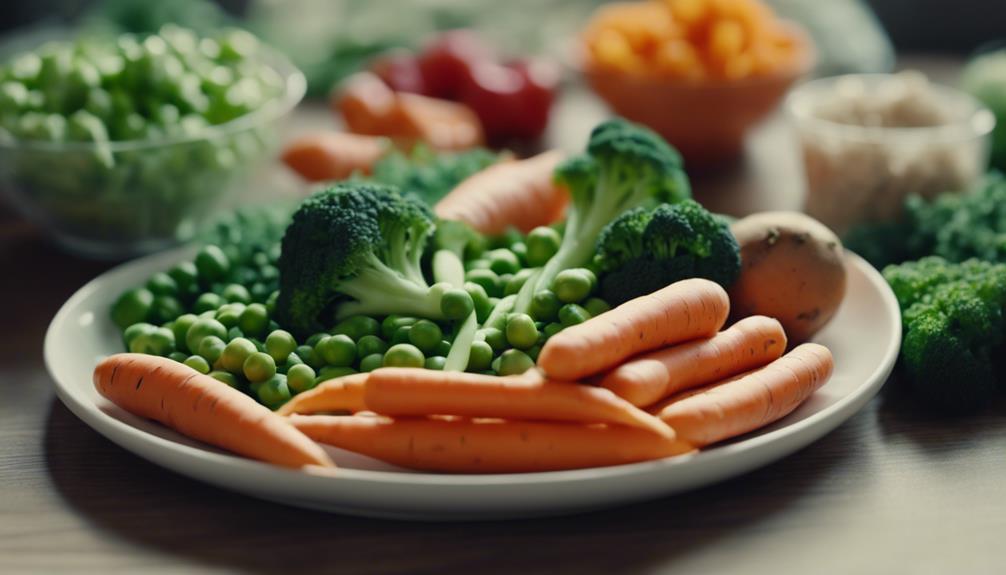
Make sure your 1-year-old's diet includes a variety of nutrient-rich vegetables to support their growth and development.
When introducing new vegetables, consider incorporating options rich in beta-carotene for eye health, like sweet potatoes and winter squash. These vegetables not only promote healthy vision but also boost immune function due to their high beta-carotene content.
Broccoli is another excellent choice, providing fiber, folate, and calcium to expand your baby's palate and support their overall well-being.
Carrots offer a significant dose of beta-carotene, along with essential vitamins A and K important for growth and development.
Additionally, tomatoes contain lycopene, which supports heart health and disease prevention.
Including these vegetables in your child's diet from the first year can lay a solid foundation for healthy eating habits and ensure they receive the necessary nutrients for optimal growth and development.
Mashed Beans for Nutrients

Consider adding mashed beans to your baby's diet to boost their iron intake for healthy blood cell production. Mashed beans serve as an excellent iron source, essential for your baby's development. These beans provide nearly 39% of the Daily Value (DV) for iron in just half a cup, aiding in the formation of healthy blood cells.
To enhance iron absorption, pair mashed beans with vitamin-C-rich foods. Black, kidney, or white beans all offer nutritious options for preparing mashed beans that your baby will enjoy. Including mashed beans in your baby's diet can be particularly beneficial for non-meat eaters, ensuring they meet their iron needs for overall growth and well-being.
Incorporating Hummus
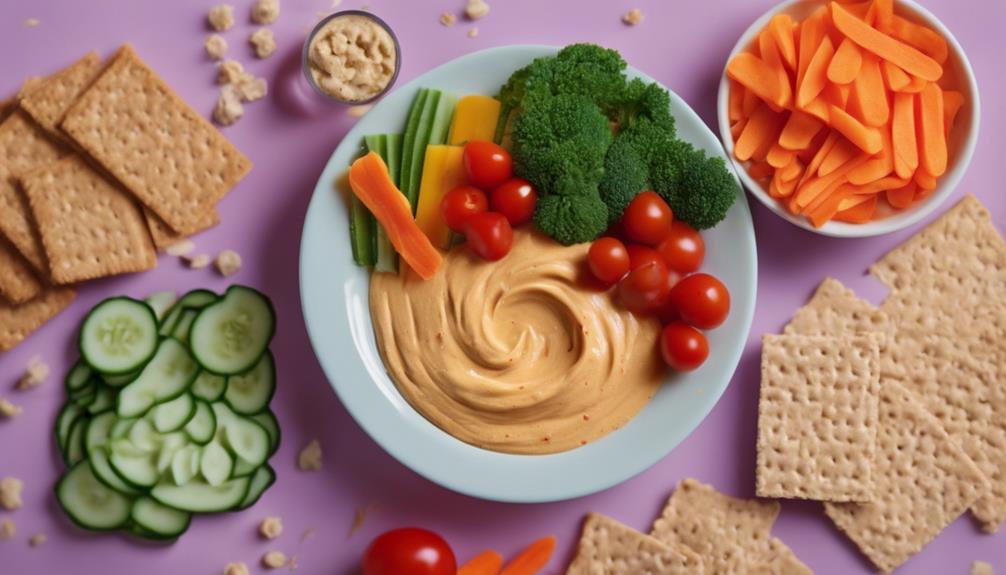
Enhance your baby's nutrient intake by introducing hummus, a flavorful and nutritious option packed with protein, healthy fats, vitamins, and minerals.
When feeding your baby, consider incorporating small amounts of hummus into their diet as it's a rich source of essential nutrients beneficial for their growth and development.
Here are some tips for introducing hummus to your baby's meals:
- Spread hummus on crackers or bread to provide a tasty and nutritious snack.
- Serve hummus alongside vegetables or fruits for added flavor and variety.
- Homemade hummus is a great option as it allows you to monitor the ingredients and ensure freshness.
- When introducing solid foods, start with a small amount of hummus to gauge your baby's reaction and tolerance.
- Including hummus in your baby's diet promotes healthy eating habits early on, offering a delicious and nutrient-dense option for added nutrition and variety.
Allergy Monitoring and Consultation
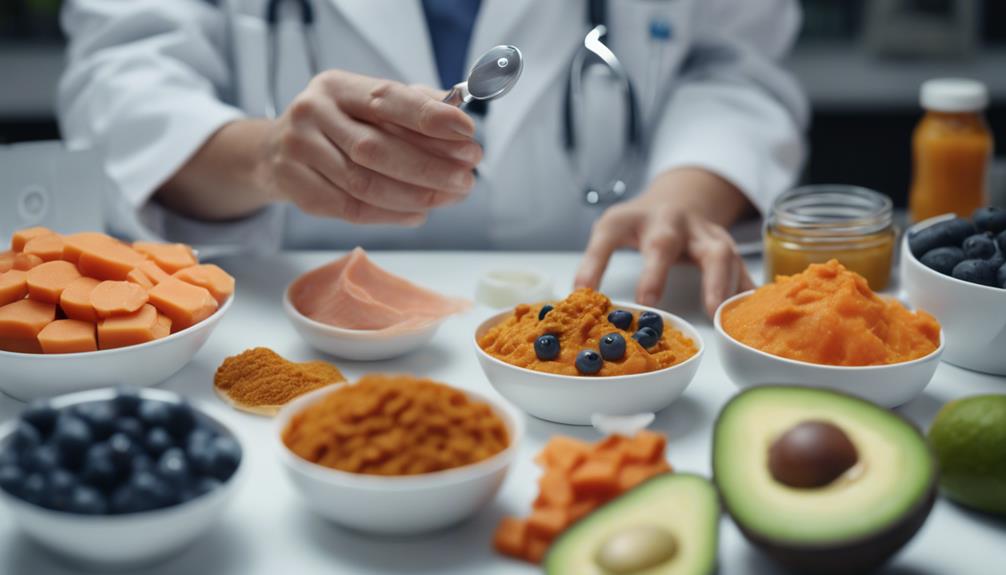
Monitoring for signs of allergies when introducing new foods to your baby is vital for their health and well-being. Watch for signs of allergies such as hives, vomiting, diarrhea, or difficulty breathing after feeding your baby a new food.
If you notice any of these symptoms, consult a pediatrician immediately to determine the cause and appropriate action. Common food allergens to be cautious of include cow's milk, eggs, peanuts, tree nuts, soy, wheat, fish, and shellfish.
Allergic reactions can vary in severity, so it's essential to be vigilant in observing any adverse reactions that your baby may have. Keep a record of foods that cause allergic reactions and avoid them in your baby's diet to prevent any future complications.
Frequently Asked Questions
What Is a List of Healthy Food for Baby?
You should consider including avocados, bananas, blueberries, broccoli, and lentils in your baby's diet. These foods offer a mix of essential nutrients like healthy fats, vitamins, fiber, and protein, which are beneficial for your baby's growth and development.
What Should a Baby Eat on a Balanced Diet?
For a balanced diet, your baby should eat a variety of fruits, vegetables, grains, protein foods, and dairy, ensuring excellent nutrition. Remember, nutrient-rich, low-sodium, and sugar-free options are best. Consult with a healthcare provider for guidance on supplements and hydration needs.
What Are Healthy Eating Ideas for Babies?
For healthy eating ideas for babies, include a variety of fruits, vegetables, grains, protein foods, and dairy in their diet. Opt for nutrient-rich, low-sodium, and sugar-free options to support their growth and development.
What Can I Eat to Get a Healthy Baby?
To get a healthy baby, focus on a balanced diet with nutrient-rich foods like avocados, bananas, and broccoli. Incorporate meats for protein and iron, and offer fiber-rich options like prunes. Remember to provide yogurt for bone health and add fruits for variety.
Conclusion
In summary, providing a healthy diet for your baby is essential for their growth and development. By incorporating nutritious first foods, essential dairy products, whole grains, protein sources, and other nutrient-dense options, you can guarantee that your baby receives the necessary nutrients for peak health.
Remember to consult with a healthcare professional if you have any concerns about allergies or dietary needs. Prioritize your baby's well-being by offering a well-rounded diet that supports their overall health and development.

